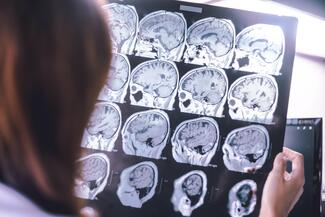Insomnia Linked With Cognitive Decline in Older Adults
Older adults with chronic insomnia were 40% more likely to develop mild cognitive impairment or dementia over a median 5.6 years compared with older adults without insomnia, according to a study published in Neurology. The finding was equivalent to 3.5 additional years of aging.
“Insomnia doesn’t just affect how you feel the next day — it may also impact your brain health over time,” said corresponding author Diego Z. Carvalho, MD, of the Mayo Clinic in Rochester, Minnesota. “We saw faster decline in thinking skills and changes in the brain that suggest chronic insomnia could be an early warning sign or even a contributor to future cognitive problems.”
The study included 2750 older adults without cognitive impairment from the population-based Mayo Clinic Study of Aging. Among them, the average age was 70.3 years, nearly half were female, and 16% had chronic insomnia. At baseline, participants were asked whether their sleep time over the past 2 weeks was greater or less than usual.
>>NEWS: Sleep Regularity Linked With Better Cognition, But Balance Patterns Best for BDNF
Participants received neuropsychological assessments annually, and some underwent magnetic resonance imaging or positron emission tomography brain scans to identify white matter hyperintensities or amyloid plaques.
Over the median 5.6-year follow-up, 14% of older adults with chronic insomnia developed mild cognitive impairment or dementia compared with 10% of older adults who did not have chronic insomnia, according to the study. After adjustments for age, high blood pressure, use of sleep medications, and sleep apnea, analysis showed a 40% higher likelihood for the development of mild cognitive impairment or dementia in the insomnia group. Those with insomnia also demonstrated faster declines on tests measuring various thinking skills.
Among participants with insomnia, researchers compared those who reported sleeping more than usual in the 2 weeks preceding the study’s start with those who said they had slept less than usual.
Sleeping less than usual, they found, was associated with lower cognitive test scores at baseline, which was comparable to 4 additional years of aging. Brain scans also revealed more white matter hyperintensities and amyloid plaques. For the latter, the effect was comparable to levels in carriers of the APOE ε4 gene, a genetic risk factor for Alzheimer disease.
In contrast, sleeping more than usual was associated with fewer white matter hyperintensities at baseline.
“Our results suggest that insomnia may affect the brain in different ways, involving not only amyloid plaques, but also small vessels supplying blood to the brain,” Dr Carvalho said. “This reinforces the importance of treating chronic insomnia — not just to improve sleep quality but potentially to protect brain health as we age.”
References























